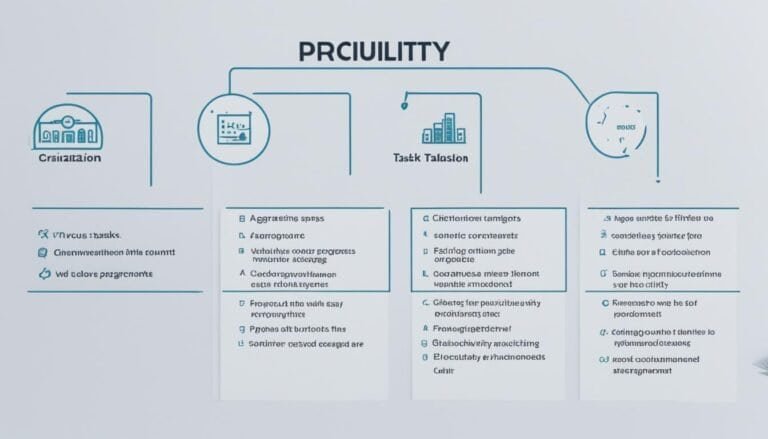Navigating the World of Online Learning: Where to Start
As the demand for online learning continues to surge, many individuals find themselves at a crossroads, uncertain of where to begin their journey. The vast array of available courses, platforms, and resources can be overwhelming, making it challenging to discern the best starting point.
It's crucial to approach this endeavor with a strategic mindset, considering factors such as your learning goals, preferred learning style, and the array of online learning platforms available.
By carefully navigating these initial stages, you can lay a solid foundation for a successful online learning experience.
Key Takeaways
- Clearly define and articulate your learning goals and objectives.
- Research and explore various online learning platforms to find the best fit for your needs.
- Take advantage of the benefits of online learning apps and communities for accessible and engaging education.
- Prioritize time management and personal well-being to ensure a successful online learning experience.
Identifying Your Learning Goals
When embarking on your online learning journey, it is essential to clearly define and articulate your learning goals to ensure focused and effective progress. Setting priorities and defining objectives are crucial steps in this process.
Start by identifying what you hope to achieve through online learning. Whether it's acquiring new skills for career advancement, gaining knowledge for personal development, or pursuing a specific certification, setting clear priorities will help you stay motivated and on track.
Once you've established your priorities, define your objectives with clarity and specificity. For example, if your goal is to learn a new programming language, specify which aspects of the language you want to focus on, such as web development or data analysis.
Evaluating Your Learning Style
Understanding your preferred learning style is crucial for optimizing your online learning experience and maximizing your retention of new knowledge and skills. Evaluating your learning style involves recognizing how you best absorb and process information. This can significantly impact the effectiveness of your online learning.
Here are some key points to consider when evaluating your learning style:
- Visual learning: If you are a visual learner, you may prefer learning through images, diagrams, and videos. Understanding concepts through visual aids can enhance your comprehension and memory retention.
- Auditory learning: Auditory learners benefit from listening and verbalizing information. They may prefer lectures, podcasts, and discussions to grasp new concepts effectively.
- Reading/writing learning: Some individuals learn best through reading and writing. They thrive on written materials, such as textbooks, articles, and note-taking, to understand and retain information.
- Kinesthetic learning: Kinesthetic learners learn best through hands-on activities and experiences. They prefer to learn by doing, such as experiments, simulations, and interactive exercises.
Identifying your primary learning style can help you tailor your online learning approach to suit your individual preferences and optimize your learning outcomes.
Researching Online Learning Platforms
Exploring various online learning platforms can provide a wealth of opportunities for expanding your knowledge and skills in a flexible and accessible manner. When researching online learning platforms, it's crucial to compare features and pricing options to find the best fit for your needs.
Start by identifying the specific skills or knowledge you want to acquire, and then consider the features each platform offers. Look for interactive elements such as live classes, discussion forums, and hands-on projects, as well as access to a diverse range of courses.
Pricing options are also a significant factor to consider. Some platforms offer monthly subscriptions, while others may require upfront payment for individual courses. Additionally, some platforms provide financial aid or scholarships to make learning more accessible.
Furthermore, reading reviews and testimonials from other users can provide valuable insights into the quality and effectiveness of the platform. It's essential to choose a platform with a user-friendly interface and reliable customer support.
Understanding Course Formats
Understanding the structure and format of online courses is crucial for success as an online learner.
From self-paced to instructor-led, various course structures offer different levels of flexibility and guidance.
Additionally, understanding the different learning modalities, such as videos, interactive quizzes, and discussion forums, will help students adapt their study strategies to maximize their learning experience.
Course Structures
An essential aspect of navigating online learning is gaining familiarity with the variety of course structures, which can significantly impact your learning experience. Understanding course structures involves considering learning outcomes, instructional methods, curriculum design, and assessment strategies.
When exploring course structures, it's important to be mindful of the following:
- Learning Outcomes: Different courses may have specific learning objectives, and understanding these outcomes can help you align your expectations with the course content.
- Instructional Methods: Varied instructional approaches, such as videos, interactive modules, or live sessions, can affect the way you engage with the material.
- Curriculum Design: The organization and sequencing of course materials play a crucial role in your understanding and retention of the content.
- Assessment Strategies: Being aware of how your knowledge will be evaluated can help you prepare effectively and manage your study time efficiently.
Learning Modalities
Gaining familiarity with the variety of course structures is foundational to navigating online learning, and this understanding naturally extends to exploring different learning modalities and course formats. When considering online learning, it's crucial to be acquainted with the various modalities and formats through which content is delivered. Two important modalities to understand are interactive simulations and virtual labs. These modalities are often used to provide hands-on learning experiences in virtual environments. Interactive simulations allow students to actively engage with course material, often through scenario-based learning, while virtual labs enable students to conduct experiments and explore concepts in a simulated laboratory setting. Understanding these modalities can help students select courses that align with their learning preferences and needs. Here's a table to illustrate the different learning modalities and course formats:
| Modality | Description | Example |
|---|---|---|
| Interactive Simulations | Immersive, scenario-based learning activities | Virtual medical simulations |
| Virtual Labs | Simulated laboratory environments for conducting experiments | Chemistry lab simulations |
Exploring Free Learning Resources
When seeking to expand your knowledge and skills through online learning, there is a plethora of free resources available to help you achieve your goals. These resources offer self-paced learning and interactive materials, allowing individuals to learn at their own speed and engage with the content in a dynamic manner.
Some of the most valuable free learning resources include:
- Open Educational Resources (OER): These are freely accessible, openly licensed text, media, and other digital assets that are useful for teaching, learning, and assessing as well as for research purposes.
- Online Tutorials: Free tutorials cover a wide range of topics, from programming languages to creative skills like photography and graphic design, providing valuable hands-on learning experiences.
- Digital Libraries: Many libraries offer free access to e-books, academic papers, and other digital resources, enabling learners to access a wealth of information without any cost.
- Educational Websites and Apps: Various websites and apps provide free educational content, including lectures, quizzes, and interactive exercises, making learning more accessible and engaging.
Exploring these free learning resources can be an excellent starting point for anyone looking to embark on their online learning journey.
Utilizing Online Learning Communities
Online learning communities offer valuable support and foster collaborative learning experiences. Engaging with a community of like-minded individuals can provide encouragement, motivation, and diverse perspectives, enhancing the overall learning journey.
Through active participation in these communities, students can gain insights, share resources, and build meaningful connections with peers and experts in their field.
Community Support
Engaging with online learning communities can significantly enhance the educational experience by providing a platform for collaboration, resource sharing, and mutual support. When seeking guidance and building connections within these communities, consider the following:
- Active Participation: Actively engage in discussions and activities to build connections with fellow learners.
- Utilize Resources: Take advantage of the diverse range of resources shared by community members to enhance your learning.
- Seeking Guidance: Don't hesitate to seek guidance from experienced members who can offer valuable insights and advice.
- Offering Support: Contribute to the community by offering support and sharing your knowledge with others.
Collaborative Learning
Utilizing online learning communities for collaborative learning can significantly enrich the educational experience by fostering meaningful interactions, knowledge exchange, and collective problem-solving. Peer collaboration within these communities allows students to engage in group projects, enabling them to share diverse perspectives and leverage each other's strengths.
Online platforms provide a space for students to work together, regardless of their geographical locations, creating a dynamic environment for collaborative learning. Through group projects, students can develop essential teamwork and communication skills, crucial for their future careers.
Additionally, the collective problem-solving approach encourages critical thinking and creativity, as individuals learn to consider various solutions and work towards a consensus.
Ultimately, online learning communities offer a supportive and interactive setting where collaborative learning thrives, preparing students for success in a rapidly evolving digital world.
Leveraging Career Advancement Opportunities
Navigating the landscape of online learning offers numerous opportunities for individuals to strategically position themselves for career advancement. Leveraging career advancement opportunities through online learning can significantly impact an individual's professional growth and development.
Here are some key ways to leverage online learning for career advancement:
- Skill Enhancement: Online learning provides access to a wide range of courses and programs, allowing individuals to acquire new skills and knowledge relevant to their career goals.
- Networking: Virtual learning platforms offer opportunities to connect with professionals from diverse backgrounds, creating a valuable network for career advancement.
- Professional Certifications: Online courses often offer certifications that can enhance a professional's credentials and demonstrate expertise in specific areas.
- Flexibility and Adaptability: Developing the ability to navigate online learning platforms demonstrates a candidate's adaptability and comfort with technology, essential skills in today's digital work environment.
Budgeting for Online Learning Expenses
As you embark on your online learning journey, it's crucial to consider the financial aspects. Budgeting for online learning expenses involves careful cost considerations and strategic financial planning.
Cost Considerations
When considering the budget for online learning expenses, it is essential to carefully assess the costs associated with tuition, materials, and technology requirements to ensure a comprehensive understanding of the financial investment involved.
- Comparing prices: Research and compare the tuition fees of different online programs to find the most cost-effective option.
- Scholarships available: Explore scholarship opportunities offered by online learning institutions or external organizations to help offset the cost of tuition.
- Financial aid options: Look into grants, loans, or employer-sponsored education assistance programs that can provide financial support for online learning.
- Technology expenses: Factor in the cost of necessary technology such as a computer, internet access, and software required for the online learning experience.
Careful consideration of these cost factors can help in creating a realistic budget for online learning.
Financial Planning
Careful financial planning is crucial for successfully managing the expenses associated with online learning, encompassing tuition, materials, and technology requirements, following a comprehensive assessment of the costs involved. When budgeting for online learning, it's essential to explore financial assistance options and scholarship opportunities to alleviate the financial burden. The following table provides an overview of potential expenses and sources of financial support:
| Expense | Estimated Cost | Financial Assistance Available |
|---|---|---|
| Tuition | $X,XXX – $XX,XXX | Scholarships, Grants, Student Loans |
| Materials | $XXX – $XXX | Textbook Scholarships, Book Grants |
| Technology Requirements | $XXX – $XXXX | Technology Grants, Equipment Loans |
Managing Your Time Effectively
Effectively managing your time is a crucial skill for success in online learning, allowing you to balance your academic responsibilities with other commitments. When navigating the world of online learning, mastering time management is essential. Here are some key strategies to help you manage your time effectively:
- Create a schedule: Establish a daily or weekly schedule to allocate time for lectures, assignments, and study sessions. This structured approach can help you stay organized and focused.
- Set priorities: Identify the most important tasks and deadlines, and prioritize them accordingly. This will ensure that you allocate sufficient time and energy to the most critical academic responsibilities.
- Minimize distractions: Find a quiet and conducive environment for studying to minimize distractions. It's important to create a dedicated workspace that allows you to concentrate without interruptions.
- Utilize productivity tools: Explore various time management apps and tools that can help you track your tasks, set reminders, and manage your study time effectively.
Setting Realistic Learning Expectations
To succeed in online learning, it is crucial to set realistic learning expectations that align with your capabilities and commitments. Setting boundaries and managing expectations are essential for a successful online learning experience. It's important to recognize that online learning requires self-discipline, time management, and a clear understanding of what you can realistically achieve within a given timeframe. Here's a table to help you visualize the process of setting realistic learning expectations:
| Setting Boundaries | Managing Expectations | Result |
|---|---|---|
| Prioritize tasks and set specific study hours | Be realistic about the time and effort required for each course | Improved focus and productivity |
| Communicate your study schedule to family and friends | Understand that learning online may require more time and effort than traditional classes | Reduced interruptions and increased support |
| Learn to say no to non-essential commitments | Celebrate small achievements and progress | Reduced stress and increased motivation |
Conclusion
In conclusion, navigating the world of online learning requires careful consideration of one's learning goals, style, and available resources.
By researching platforms, understanding course formats, and leveraging free learning resources, individuals can advance their careers and manage their expenses effectively.
It is crucial to set realistic learning expectations and manage time wisely to succeed in the online learning environment.
With the right approach, online learning can be a valuable and enriching experience for learners.






